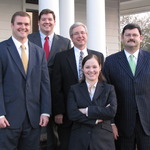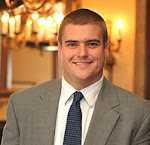My theory is that both doctors and lawyers have professional lives that lend themselves to TV storytelling. I don't mean there's any inherent glamour in what we do, it's just that doctors have an endless supply of patients and lawyers an endless supply of clients, so our lives have both episode-length story arcs (cases/patients) and long term narratives revolving around the doctors/lawyers' lives themselves.
Anyway, I got to thinking about this after representing a doctor recently. It sparked the idea to write a post comparing lawyers to surgeons, but the more I thought about it the less perfect the comparison was, especially for family law.
Sure, you could say some of the issues family lawyers handle are comparable to surgical procedures - we intervene in an ongoing life and try to correct some problem that we find there, often using creative techniques that may be aggressive or very measured depending on the needs of the patient/client.
It's more problematic when you start talking about outcomes and goals. For some legal issues, you can continue the surgical comparison. For example, if you and your spouse are both unhappy but both unwilling to leave the marital home, getting possession of the home is a finite goal I can try to achieve for you. There can be complications, delays, and sadly sometimes bad outcomes, but the goal is clearly defined.
The same comparison is harder to make with child custody disputes. Custody cases never really "end," at least not until the child turns 18, and even then there can be issues of unpaid child support that linger for months or years. Ideally, parents are able to come up with a custody agreement that is built to last and doesn't require constant battles over modification or contempt, but let's face reality - if all divorced parents could get along they wouldn't be divorced and I likely wouldn't be employed!
When choosing your domestic attorney, if you have kids I cannot urge you enough to think long-term and be ready to have a broad ranging discussion about where you see your life and your children's lives going through the rest of their childhood.
The same comparison is harder to make with child custody disputes. Custody cases never really "end," at least not until the child turns 18, and even then there can be issues of unpaid child support that linger for months or years. Ideally, parents are able to come up with a custody agreement that is built to last and doesn't require constant battles over modification or contempt, but let's face reality - if all divorced parents could get along they wouldn't be divorced and I likely wouldn't be employed!
When choosing your domestic attorney, if you have kids I cannot urge you enough to think long-term and be ready to have a broad ranging discussion about where you see your life and your children's lives going through the rest of their childhood.
For example, a few years ago I helped a man secure a 50-50 custody schedule with his child, even though he was sure the child's mother was bringing her new boyfriend around and probably creating an unhealthy environment. Mother did not have any "red flags" like drug addiction or mental illness, and she had arguably spent more time as the primary caregiver during the marriage. My client's concerns were real, and there was evidence that mother wasn't all that interested in being a full-time parent anymore, but those were speculations on our part. I urged my client to think about where this case would be in another year or so. Did he really think his wife would stay put? Did he really think she would put the child first? Did he trust that his child, who was already a preteen, wouldn't recognize who is really putting her first and start to gravitate toward him?
My client didn't like it, but he went with the deal on the table. Not long ago, I finished drafting a consent order modifying the original deal and giving my client primary custody because his ex-wife is relocating out-of-state.
That's a great story and I'm proud to shave helped my client but it kind of screws with my surgical analogy.
In thinking about these things, I decided that sometimes lawyers are less like surgeons and more like chiropractors. We fight against the inevitable forces of gravity and time. When things get so out of whack you can't function, we do our best to adjust you, get you feeling right again, but then send you back out into the fray.
This post turned out much more "meta-" than my usual offerings, but sometimes that's a good thing I guess. Clients often feel like the big picture gets lost in all the legal maneuvering, so sometimes a little "big picture think" is in order. Long story short, be open minded. Sometimes you need me to be surgical. Direct, uncompromising, goal-oriented. Sometimes you need me to be the chiropractor - there is no permanent fix but please do something to make the pain stop!
In thinking about these things, I decided that sometimes lawyers are less like surgeons and more like chiropractors. We fight against the inevitable forces of gravity and time. When things get so out of whack you can't function, we do our best to adjust you, get you feeling right again, but then send you back out into the fray.
This post turned out much more "meta-" than my usual offerings, but sometimes that's a good thing I guess. Clients often feel like the big picture gets lost in all the legal maneuvering, so sometimes a little "big picture think" is in order. Long story short, be open minded. Sometimes you need me to be surgical. Direct, uncompromising, goal-oriented. Sometimes you need me to be the chiropractor - there is no permanent fix but please do something to make the pain stop!


